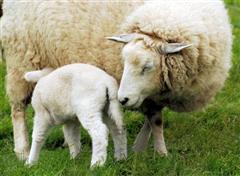|
Don't You Deserve Organic Wool?If you like to wear wool, don't you deserve to enjoy the purity of organic wool? 
Wool is one of nature's most unique masterpieces. It has been used for decades and is especially known for it's durability and warmth. However, it has become somewhat of a forgotten fiber because it's commonly perceived as being heavy, itchy and scratchy. Well now it's had a bit of a face-lift with rapidly growing interest. Special sheep breeds,
like the merino have now made wool itch a thing of the past.
What Is Organic Wool? Organic wool originates from healthy sheep raised on an organic farm. Many wool producers are embracing the demand for organic wool. Consumers and designers fuel the fire by being aware of health issues and making a conscious effort to be environmentally responsible. Benefits Of Organic Wool Aside from it's natural softness and comfort, organic wool offers up several other benefits:
Disadvantages Of Wool Clothing The main complaint about wool clothes is the prickly or scratchy feeling. Many people who think they have a wool allergy may actually be experiencing a reaction to the harsh chemicals used in conventional processes, rather than the wool itself. However, some people may be sensitive to lanolin, which is the oil naturally found in wool. Reaction to dyes could be another culprit. The itchy, prickly feeling is often caused by shorter fibers and may become more noticeable with increased skin temperature and moisture. Using material such as silk or cotton between your skin and the wool clothing will alleviate this feeling. Wool clothing with organic cotton blended in also delivers a softer feel with less itch. The other option is to buy high end wools such as Merino wools which utilize finer fibers and is spun smoothly, with no itch factor. Wool Clothing Care Wool clothes are easy to care for but to keep them looking gorgeous for years, you need to follow a few simple rules. Everyday Care
To store, fold your garment rather than hanging it. Wrap in natural paper. Hand washing It's a good idea to check the label before laundering your garment.
Luxury has been created with this sustainable resource, and the new clothing and linens have a sophisticated look and feel. Spoil your skin - try some organic wool. Environmental Benefits Organic sheep wool is highly renewable resource that is easily sustained using organic methods. In a worldwide "living green" movement, eco-wool is emerging as a hot new market. This means that they have been grazed on land that is pesticide and fertilizer free, and haven't been exposed to synthetic or harmful chemicals that are harmful to humans or the livestock.The result is disease free animals with healthy immune systems. Sheep are shorn annually in an animal-friendly manner. This naturally renewable resource is highly sustainable and doesn't cause environmental pollution. The natural fibers are recyclable and biodegradable. Right from the farm to the finished wool product, organic wool has not been chemically treated. When it comes to processing, raw wool is cleaned using biodegradable cleansing agents, then it's carded and spun at organic mills. Organic agriculture is one of the fastest growing areas of agriculture. On a global scale, organic wool production accounts for approximately 1.3 tonnes per annum. About 60% of that is processed into apparel. That's a drop in the bucket compared to the overall growth potential. The global marketplace is awakening and demonstrating a need for organic wool. Many growers are turning to organic farming methods. Consumer support will help them succeed, and why not? In the end, we benefit dramatically too. Choosing eco wool clothing promotes a positive human lifestyle and is infinitely more beneficial for animal and environmental health. Care What You Wear... Discover THE BEST Organic Wool Styles
Find Out More
Return from Organic Wool to Home Page
|





